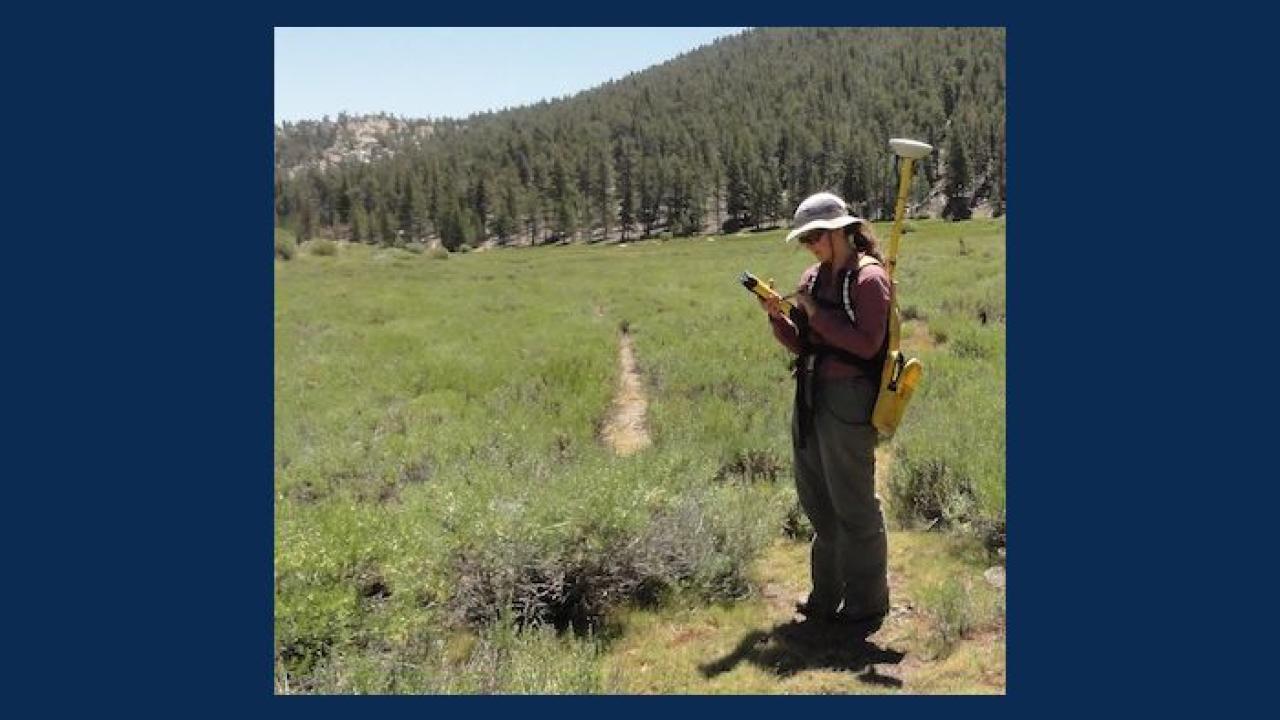
Sierra Meadows and Climate Change
UC Davis watershed scientists have identified several promising ways to conserve imperiled Sierra Nevada fish and amphibians in the face of climate change.
The findings, presented at this week’s American Geophysical Union (AGU) conference in San Francisco, show how Sierra meadows could be managed to give multiple species a better chance of survival.
One of the greatest climatic concerns in California is the predicted decline in Sierra snowpack and snowmelt, the state’s main water supply source. The warming will likely mean less precipitation as snow, earlier snowmelt, and a shift in snowmelt runoff to earlier in the year.
Researchers at the UC Davis Center for Watershed Sciences examined how these changes would affect meadows in the Sierra and the many “ecosystem services” they provide, from water filtration to grazing and key habitat for fish and wildlife. They then devised strategies to miminize meadows’ vulnerability to climate change.
In a related study, the scientists identified the meadows that would be most resilient to warming as stronghold habitats for three sensitive species – the mountain yellow-legged frog, the Yosemite toad and the southern long-toed salamander.
The research on Sierra meadows of the Sierra Nevada – led by the Center’s associate director, Joshua Viers, and supported by researchers Sarah Yarnell and Ryan Peek – are part of the Center’s multidisciplinary Sierra Nevada Strategies group, which uses a combination of river ecology, watershed science and computer modeling to improve management of water resources across the 400-mile-long range.
The Center is well represented at this year’s AGU conference in San Francisco, which attracts nearly 20,000 Earth and space scientists, educators, students, and policymakers worldwide. As many as 16 scientists affiliated with the Center are giving talks or presenting posters on various innovative approaches to water resources management.
Links to the research summaries (Bold-faced names are Center faculty, staff researchers, graduate students or alumni):
Hydroclimatic alteration increases vulnerability of montane meadows in the Sierra Nevada, California. Joshua H. Viers, Ryan Peek, Sabra E. Purdy, Jason D. Emmons, Sarah M. Yarnell
Using sensitive montane amphibian species as indicators of hydroclimatic change in meadow ecosystems of the Sierra Nevada, California. Ryan Peek, Joshua H. Viers, Sarah M. Yarnell
Integrating participatory engagement and scientific research to inform causes and solutions to water problems in the River Njoro Watershed, Kenya. Marion (Mimi) Jenkins
Integrating Economics into Water Resources Systems Analysis. Richard Howitt
Hydro-economic Modeling: Reducing the Gap between Large Scale Simulation and Optimization Models. Laura Forni, Josué Medellín-Azuara, David Purkey, Brian A. Joyce, Jack Sieber, Richard Howitt
Recharge as an Ecosystem Service and Disservice in a Midwestern, Urbanizing, Agricultural Watershed with an Increasing Precipitation Trend. Eric G. Booth, Samuel C. Zipper, Steven P. Loheide, Christopher J. Kucharik
Adaptive Governance and Resilience: The Columbia River Basin. Barbara Cosens, Jan Boll, Alexander K. Fremier
Effects of the spring snowmelt recession on abiotic and biotic conditions in northern Sierra Nevada CA rivers with varying flow regimes. Sarah M. Yarnell, Ryan Peek, Joshua H. Viers
Analysis for water conflicts in a changing world. Jay R. Lund
Assessing the combined effect of dams and climate warming on streamflow in California's Sierra Nevada for regional-scale adaptation. David E. Rheinheimer, Joshua H. Viers
Sub-daily Hydrologic Alteration due to Hydropower Operations in the Bio-Bio river in Southern Chile. Marcelo A. Olivares, Mauricio Fernandez, Carlos Benavides, Rodrigo Palma
Cheap and Cheerful Stream Restoration - An Example of System Wide Woody Addition Treatment. Joseph M. Wheaton, Stephen N. Bennett, Nick Bouwes, Reid Camp
A Framework for Incorporating Hydroclimate Variability in Regulated Rivers: Implications for Hydropower Relicensing in California's Yuba River. Masih Akhbari, Sarah E. Null, Joshua H. Viers, David E. Rheinheimer, Jason D. Emmons <a href="http://static.coreapps.net/agu-fm12/abstracts/PA43A-1968.html>Staggering successes amid controversy in California water management. Jay R. Lund
Optimizing the Dammed: water supply losses and fish habitat gains from dam removal in California. Sarah E. Null, Josué Medellín-Azuara, Jay R. Lund
